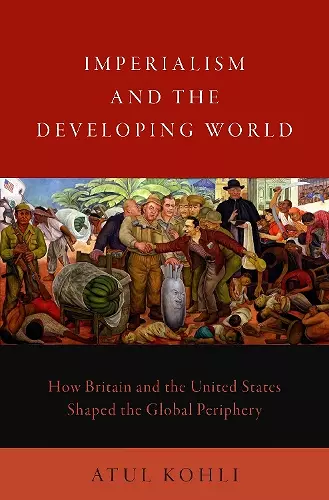Imperialism and the Developing World
How Britain and the United States Shaped the Global Periphery
Format:Hardback
Publisher:Oxford University Press Inc
Published:9th Apr '20
Currently unavailable, and unfortunately no date known when it will be back
This hardback is available in another edition too:
- Paperback£23.99(9780197582497)

Atul Kohli examines the impact of Western imperialism on developing regions, highlighting how British and American expansionism prioritized national economic interests, often undermining sovereignty and hindering economic progress in Asia, Africa, and beyond.
In Imperialism and the Developing World, Atul Kohli examines the impact of Western imperialism on various regions of the developing world, focusing on British and American influences from the era of the British East India Company to recent conflicts like the U.S. war in Iraq. Kohli posits that the expansionist policies of both Britain and the United States were driven by the desire to enhance national economic prosperity. He highlights how this expansion often hindered economic development in poorer regions, revealing a complex relationship between imperial ambitions and the well-being of affected societies.
Kohli categorizes imperialism into two distinct types: formal colonial empires, exemplified by Britain's 19th-century dominance, and informal empires, such as the U.S. influence in the 20th century, which lacked direct territorial control. He argues that both forms of imperialism have consistently undermined the potential for steady economic progress in peripheral regions, albeit in varying degrees. This analysis sheds light on the mechanisms through which imperial powers limited the sovereignty of weaker states, thereby ensuring that their economies remained open to Anglo-American interests.
The author emphasizes the significance of sovereignty as an economic asset, essential for the development of states capable of fostering inclusive and prosperous societies. Kohli illustrates how the loss of sovereignty has adversely affected the life chances of individuals in Asia, Africa, the Middle East, and Latin America. Ultimately, Imperialism and the Developing World provides a critical understanding of the historical and contemporary implications of imperialism, urging readers to consider the long-lasting effects on global economic dynamics.
There is much to love about Imperialism and the Developing World. It is extensive, it is provocative, and it provides a great template for historically informed scholarship that is also relevant to contemporary political issues . . . a remarkably ambitious book that will be relevant to a multidisciplinary constituency of readers for years to come. * Andrew S. Rosenberg, Perspectives on Politics *
Imperialism and the Developing World is a creative and readable approach to the history of British and American imperialism .... [It] powerfully advances the concept of informal empire and demonstrates the significance of sovereignty in economic histories of imperialism. * Siddharth Sridhar, Left History *
[T]his is a good book, well written and reflects the labours of first class research and handling of sources. * Gabriel O. Apata, Theory, Culture and Society *
An immersive account of the history of imperialism for those seeking a refined and concise introduction to the empirical literature ... students of history and international relations will derive useful insights from the book, which can be used to initiate fruitful class discussions for graduate courses on this topic. * Efe Can Gürcan, Progress in Development Studies *
Kohli's new book marks an invaluable contribution to the studies of development in the non-Western world. The study sharpens our understanding of the political association between imperialism and underdevelopment by identifying the deterrence of the rise of a sovereign state as a key causal process. * Makio Yamada, Japanese Journal of Political Science *
an ambitious analysis of the imperialistic adventures of Great Britain and the United States across some 400 years ...Kohli's analysis is based on an enormous trove of historical sources, and frequently illustrated with striking quotes from contemporary actors and observers. ... [His] This Weberian framing ... may be the book's most important and enduring contribution. It is powerful enough to account for themes echoing across four centuries and two different imperial powers .... It is an articulate opening salvo in what is bound to be a productive scholarly conversation. * Sarah Babb, The Journal of Development Studies *
Kohli's new work is as important, equally engaging, and as much thoroughly researched as the first 'volume'. It answers three key questions: first, why do imperialists imperialise? Second, how do they do that? And, third, with what consequences on both the metropole and the imperialised country? * Diego Maiorano, Institute of South Asian Studies(ISAS), at the National University of Singapore(NUS), Institute of South Asian Studies, National University of Singapore *
The silos of regional expertise that divides the discipline of political science make Kohli's ambition and ability to construct such a thorough empirical and analytical exercise at this scale both rare and impressive. Some of the most rewarding moments of the book for me were the various insights these attentive explorations yielded. * Sandipto Dasgupta, New School for Social Research, New York, The India Forum *
Kohli makes an admirable foray into the common ground between history, political economy, and international relations. His volume should find a comfortable place on the shelves of all three. * Jason Parker, Texas A&M University, History: Reviews of New Books *
ISBN: 9780190069629
Dimensions: 152mm x 236mm x 46mm
Weight: 885g
560 pages